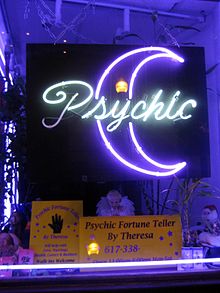
Back وسيط روحاني Arabic Ekstrasens AZ Екстрасенс Bulgarian সাইকিক Bengali/Bangla Senzibil Czech Seicig CY Μέντιουμ Greek Psíquico Spanish سایکیک FA Psyykikko Finnish
| Part of a series on the |
| Paranormal |
|---|
 |
A psychic is a person[a] who claims to use powers rooted in parapsychology, such as extrasensory perception (ESP), to identify information hidden from the normal senses, particularly involving telepathy or clairvoyance; or who performs acts that are apparently inexplicable by natural laws, such as psychokinesis or teleportation. Although many people believe in psychic abilities, the scientific consensus is that there is no proof of the existence of such powers, and describes the practice as pseudoscience.
Psychics encompass people in a variety of roles. Some are theatrical performers, such as stage magicians, who use various techniques, e.g. prestidigitation, cold reading, and hot reading, to produce the appearance of such abilities for entertainment purposes. A large industry and network exist whereby people advertised as psychics provide advice and counsel to clients.[1] Some famous psychics include Edgar Cayce, Ingo Swann, Peter Hurkos, Janet Lee, Miss Cleo,[2] John Edward, Sylvia Browne, and Tyler Henry. Psychic powers are asserted by psychic detectives and in practices such as psychic archaeology and even psychic surgery.[3]
Critics attribute psychic powers to intentional trickery or to self-delusion.[4][5][6][7] In 1988 the U.S. National Academy of Sciences gave a report on the subject and concluded there is "no scientific justification from research conducted over a period of 130 years for the existence of parapsychological phenomena".[8] A study attempted to repeat recently reported parapsychological experiments that appeared to support the existence of precognition. Attempts to repeat the results, which involved performance on a memory test to ascertain if post-test information would affect it, "failed to produce significant effects" and thus "do not support the existence of psychic ability" of this kind.[9]
Psychics are sometimes featured in science fiction and fantasy fiction. Examples of fiction featuring characters with psychic powers include the Star Wars franchise, which features "Force-sensitive" beings who can see into the future and move objects telekinetically, along with Dungeons & Dragons and some of the works of Stephen King, amongst many others.
Cite error: There are <ref group=lower-alpha> tags or {{efn}} templates on this page, but the references will not show without a {{reflist|group=lower-alpha}} template or {{notelist}} template (see the help page).
- ^ Matthew Nisbet (May–June 1998). "Psychic telephone networks profit on yearning, gullibility". Skeptical Inquirer.[permanent dead link]
- ^ "FTC Charges "Miss Cleo" with Deceptive Advertising, Billing and Collection Practices". FTC. February 14, 2002. Archived from the original on August 28, 2008. Retrieved October 6, 2008.
- ^ James Randi (1982). Flim-Flam! Psychics, ESP, Unicorns, and Other Delusions. Prometheus Books. pp. 173–195. ISBN 978-0-87975-198-2.
- ^ Gracely, Ph.D., Ed J. (1998). "Why Extraordinary Claims Demand Extraordinary Proof". PhACT. Archived from the original on 2013-01-15. Retrieved 2007-07-31.
- ^ "Psychic Debunking". NOVA. Season 19. Episode 3. April 15, 1993. PBS.
- ^ "She Told Them Boy was Dead. Crystal Ball Fails Psychic in MO. Kidnap". NY Daily News. New York. January 18, 2007. Archived from the original on 2008-12-07. Retrieved 2008-10-07.
- ^ Shari Waxman (June 13, 2002). "Shooting crap:Alleged psychic John Edward actually gambles on hope and basic laws of statistics". Salon.com. Archived from the original on June 7, 2011.
- ^ Druckman, D.; Swets, J. A., eds. (1988). Enhancing Human Performance: Issues, Theories and Techniques. National Academy Press, Washington, D.C. p. 22. ISBN 978-0-309-07465-0.
- ^ Ritchie SJ, Wiseman R, French CC (2012). "Failing the future: three unsuccessful attempts to replicate Bem's 'retroactive facilitation of recall' effect". PLOS ONE. 7 (3): e33423. Bibcode:2012PLoSO...733423R. doi:10.1371/journal.pone.0033423. PMC 3303812. PMID 22432019.